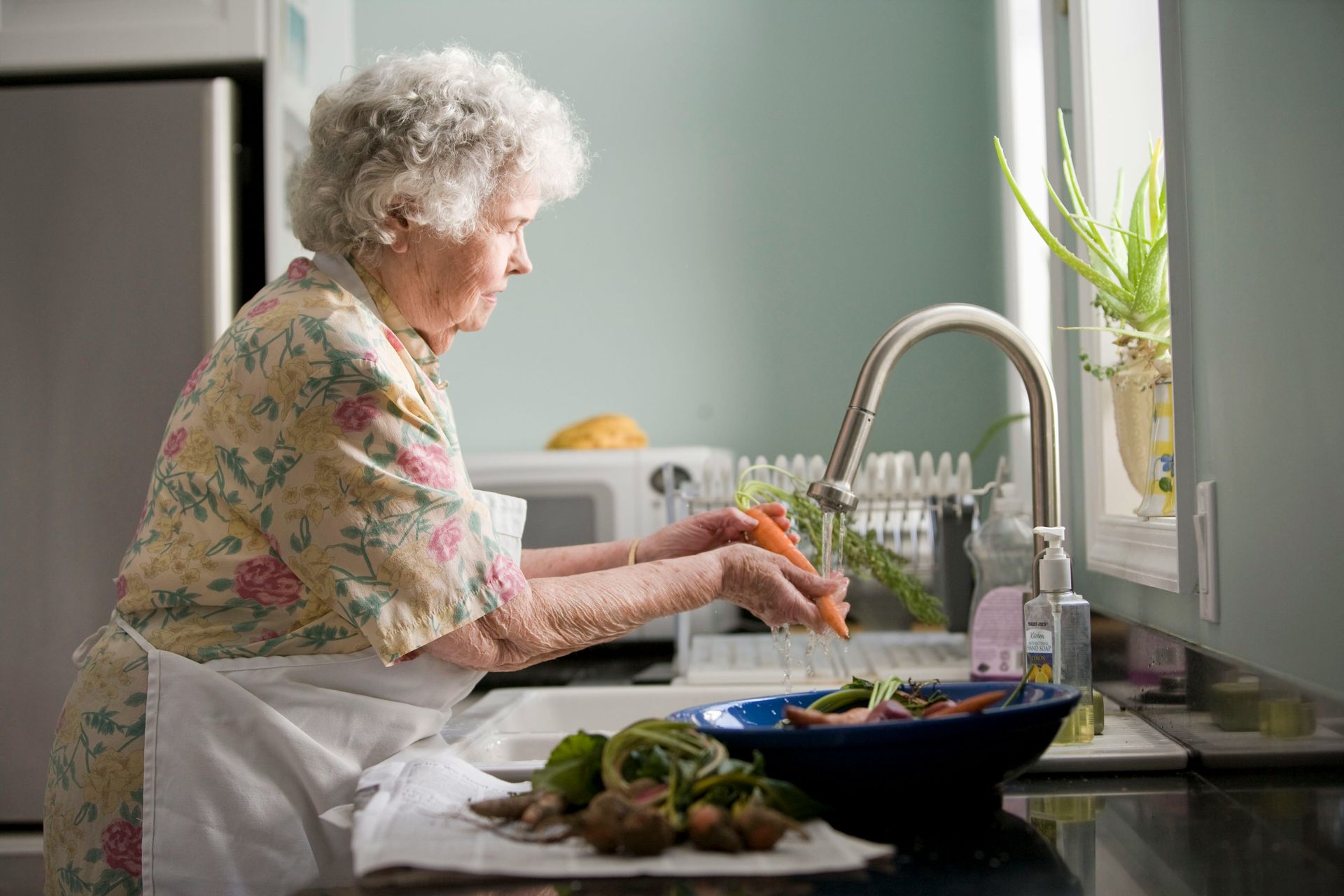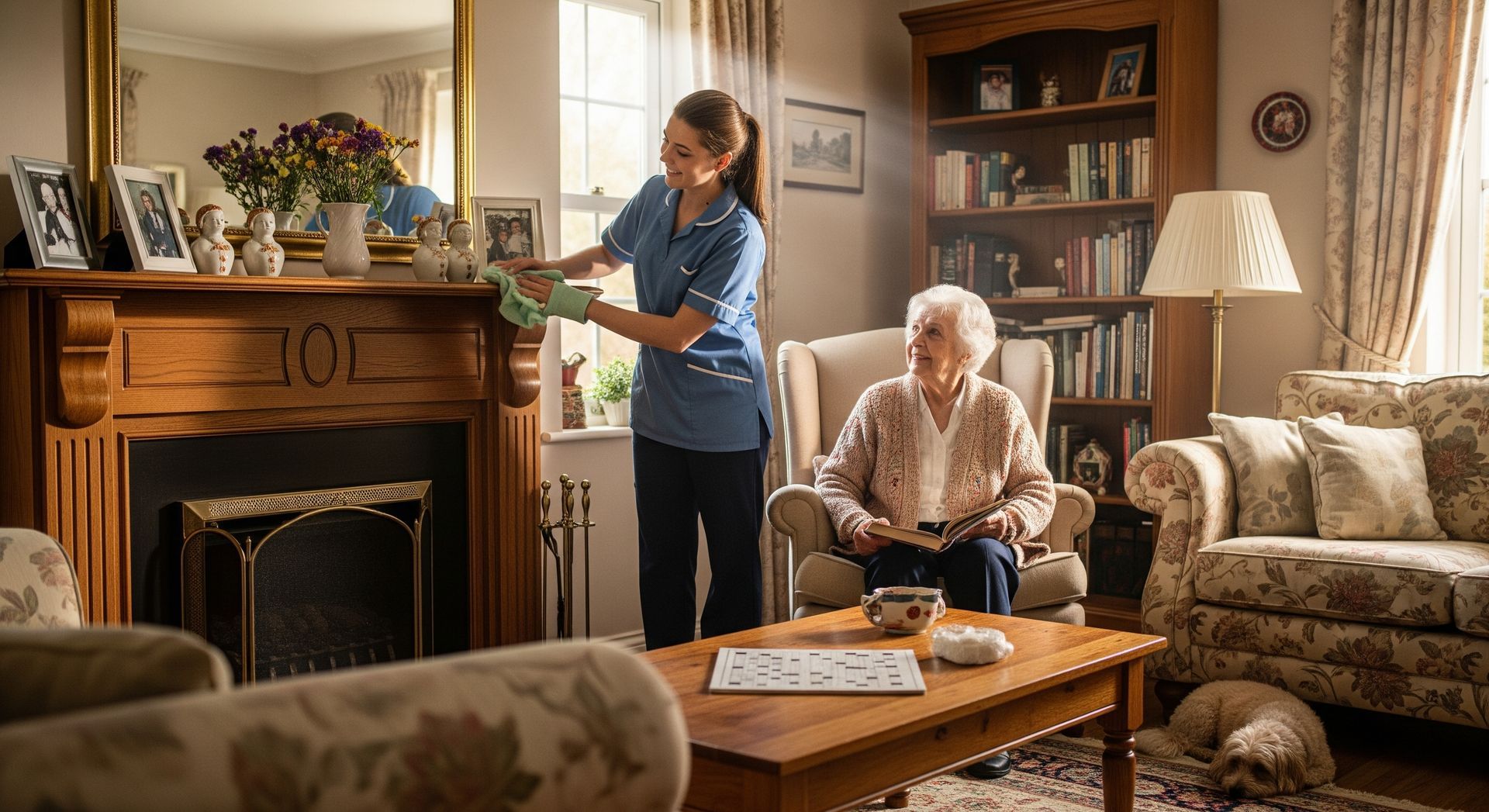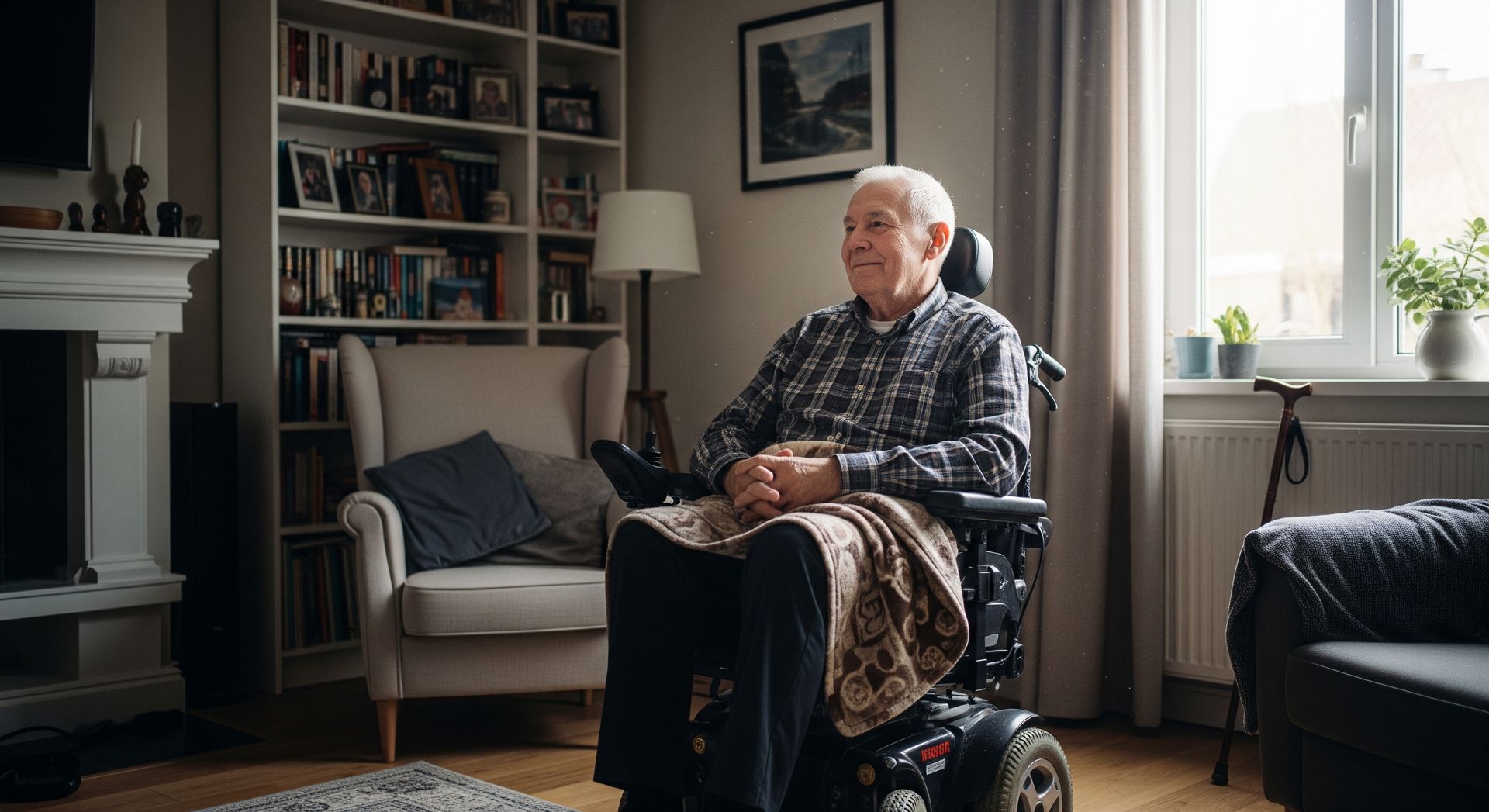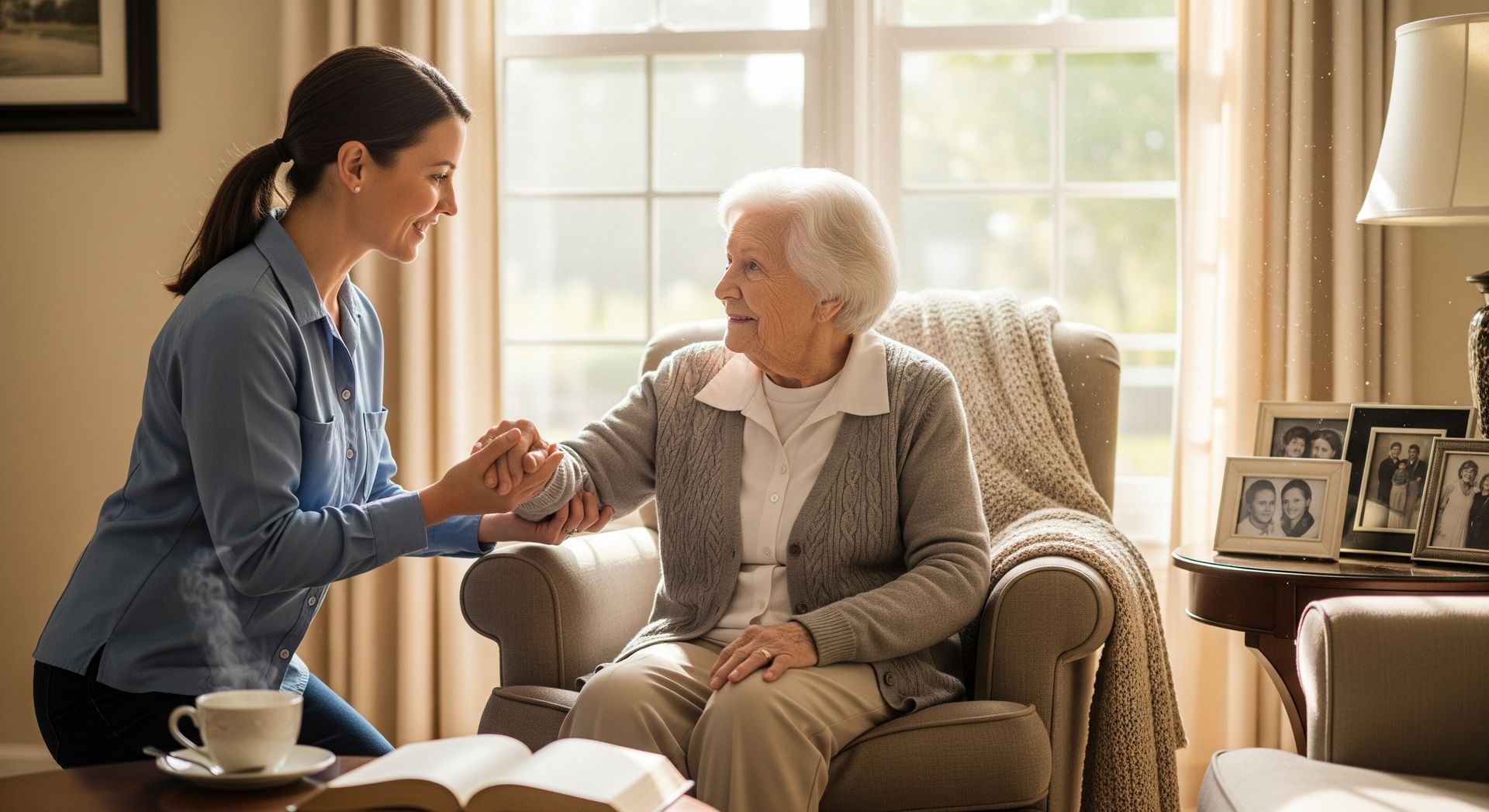Discovering the Role of Non-Medical Senior Care
Non-medical senior care is all about lending a hand with everyday stuff—think cooking, cleaning, or just keeping company—without any medical fuss. It helps your loved ones stay comfy and independent, making daily life easier and less lonely. Plus, it eases the load on family caregivers, so everyone wins. It’s like having a friendly helper who knows how to brighten days while keeping safety in check. To see exactly what kinds of help are available, check out our senior care services.
And if you're curious about who we are and how we care for families across San Jose and Campbell, visit our About page. Stick around, and you’ll get the full scoop on how this care keeps seniors thriving.
Key Takeaways
- Non-medical senior care provides support with daily tasks like bathing, dressing, cooking, and cleaning without involving medical treatments.
- It offers companionship to reduce loneliness and promote emotional wellbeing among seniors.
- This care helps maintain seniors’ independence by assisting with errands, reminders, and safe mobility.
- Family caregivers benefit from reduced burnout as non-medical care shares caregiving responsibilities.
- Effective non-medical care integrates with medical services, ensuring comprehensive and coordinated support for seniors.
Defining Non-Medical Senior Care
Non-medical senior care is all about helping older adults with everyday tasks, without diving into the medical stuff. When you hear “non medical definitions,” think of it as any support that doesn’t involve doctors, nurses, or treatments. It’s the kind of senior care that focuses on making life easier and more comfortable—like lending a hand with cooking, cleaning, or just keeping company. You’re not dealing with meds or medical equipment here, but you’re still making a huge difference. It’s about being there for someone, helping them feel safe and connected. If you’ve ever wondered how to support an aging loved one without stepping into the medical world, this is it. Non-medical senior care is like the friendly neighbor who checks in, the helping hand that keeps things running smoothly. It’s simple, but it means the world to those who need it.
Key Services Provided in Non-Medical Senior Care
When it comes to non-medical senior care, you’ll find a bunch of helpful services that make life easier and more enjoyable. From personal care assistance like bathing and dressing, to companionship that keeps loneliness at bay, there’s a lot to cover. Plus, household support services jump in to handle chores, so seniors can just relax and enjoy their day.
Personal Care Assistance
Although personal care assistance might sound simple, it plays a huge role in helping seniors stay comfortable and independent at home. When you support a loved one with personal hygiene tips, like gentle reminders for brushing teeth or easy ways to wash up, you’re doing more than just helping—they feel respected and cared for. Mobility assistance techniques, like steadying a hand during walking or guiding them safely up stairs, make a big difference too. These small acts build trust and confidence, keeping daily life smooth and safe. It’s about creating a warm space where your senior feels secure, not just looked after.
Companionship and Socialization
Loneliness can sneak up on anyone, especially seniors, and companionship is one of the best ways to keep it at bay. When you’re part of regular social activities, you feel connected and valued, which lifts your spirits and brightens your day. Non-medical senior care often includes friendly visits, games, or outings that make it easier to stay engaged. Plus, having someone around to offer emotional support means you’re never really alone, even during tough times. It’s like having a trusty sidekick who listens, chats, and shares a laugh or two. These moments of connection help you build bonds and enjoy life more fully, reminding you that you truly belong in a caring community. After all, everyone needs a friend!
Household Support Services
Feeling connected and supported is just part of the picture—keeping your home safe and comfortable matters a lot too. Homemaking services step in to help with those everyday tasks that might feel a bit overwhelming. They take care of household chores and home maintenance so you can relax and enjoy your space without stress.
Here’s what they often handle for you:
- Light cleaning and tidying up
- Laundry and ironing
- Meal preparation assistance
- Minor home repairs and upkeep
- Grocery shopping and errands
These services create a
cozy, well-kept home where you feel secure and cared for. It’s like having a
helpful friend around, making life smoother and your home a true haven. You deserve that kind of support!
Benefits of Non-Medical Support for Seniors
When seniors get a little extra help with daily tasks, life can suddenly feel a whole lot easier and happier. You’ll notice that this kind of support does more than just lighten the load—it boosts emotional wellbeing too. Having someone around to assist means less stress, and that’s a big deal when it comes to feeling good inside. Plus, it opens doors for social engagement. Whether it’s chatting over a cup of tea or joining in on community activities, staying connected with others keeps loneliness at bay. You might even find that this support encourages seniors to share stories and laughter more often, which is like a daily vitamin for the soul.
How Non-Medical Care Supports Independence
Some may assume accepting help means giving up independence—but it’s often the opposite. Support with basic tasks allows seniors to maintain control of their routines and enjoy life more fully. In some cases, non-medical care also includes emergency assistance options for added safety, giving families peace of mind while allowing seniors to stay in their homes longer.
Here’s how non-medical care enhances autonomy:
- Assisting with chores so you can focus on what you love
- Providing companionship to keep loneliness at bay
- Helping with errands so you stay active in your community
- Offering reminders for appointments and medications without taking over
- Encouraging safe mobility to explore your surroundings freely
These small, thoughtful supports aren’t about taking control—they’re about enhancing your autonomy. They create a safety net that lets you live your life your way, while still getting the help you need. It’s like having a friend who’s always got your back, helping you stay independent and connected.
Differences Between Medical and Non-Medical Senior Care
So what separates medical care from non-medical care? Medical care involves licensed professionals handling health issues, while non-medical care supports day-to-day living—things like cooking, grooming, and companionship. If you're unclear on which option is best, our article on Home Care vs. Home Health Care breaks down the differences clearly.
Caregiver Responsibilities Overview
There are a few key differences between medical and non-medical senior care that can really change what a caregiver does day to day. When you think about caregiver training, non-medical caregivers focus more on daily living support and building strong caregiver communication with seniors and their families. They’re your go-to for companionship and practical help rather than medical procedures.
Here’s what you can expect from their role:
- Assisting with meal preparation and reminders
- Helping with personal hygiene and grooming
- Providing companionship and emotional support
- Managing light housekeeping tasks
- Coordinating social activities and outings
This kind of care is all about creating a
warm, supportive environment. You’re not just a helper—you’re part of a
caring team that makes seniors feel valued and connected.
Types Of Senior Assistance
When it comes to senior care, understanding the types of assistance available can really help you figure out what fits best for your loved one’s needs. Medical care focuses on health-related tasks like managing medications or wound care, usually provided by professionals. Non-medical senior care, on the other hand, covers everyday support such as meal prep, companionship, or help with senior mobility aids like walkers or grab bars. It’s about keeping life comfortable and safe. Plus, tapping into community resources can make a big difference, offering social activities or transportation services that keep seniors connected.
Choosing the Right Non-Medical Care Provider
How do you pick the perfect non-medical care provider without feeling overwhelmed? Start by focusing on what really matters to you and your loved one. You want someone skilled, trustworthy, and who fits your family’s vibe.
Here’s a quick checklist to guide you:
- Check provider qualifications to verify they know their stuff and are properly trained.
- Ask about customizing a care plan that matches your loved one’s unique needs.
- Meet potential caregivers to see if their personality clicks and feels like a good fit.
- Read reviews or ask for references from families who’ve been in your shoes.
- Confirm flexibility in scheduling to accommodate unexpected changes or special requests.
Integrating Non-Medical Care With Medical Treatments
Picking the right non-medical care provider is a big win, but the story doesn’t end there. You want to make sure everyone’s on the same page, which means integrating therapies and coordinating care between non-medical helpers and medical professionals. When these teams work together, it’s like a well-conducted orchestra—each player knows their part, and the result feels seamless. For you, this means better support for your loved one, with personal care that complements their medical treatments perfectly. Imagine caregivers reminding about medications, encouraging exercises from therapy, or just noticing little changes that doctors should know about. That kind of teamwork keeps everyone connected and helps catch problems early. Plus, it gives you
peace of mind, knowing your family member isn’t just getting care—they’re getting the
right care. So, think of this integration as building a supportive village, where every helper plays a role in keeping your loved one safe and comfortable.
Frequently Asked Questions
How Are Non-Medical Senior Care Services Typically Funded?
You’ll typically fund non-medical senior care through private pay, since insurance coverage often doesn’t include these services. Many families come together, sharing costs and support, creating a community that helps everyone feel connected and cared for.
What Training Do Non-Medical Senior Care Providers Receive?
You’ll find caregiver qualifications vary, but most complete training programs covering safety, communication, and basic care skills. These programs prepare you to confidently support seniors, creating a caring community where everyone feels valued and connected.
Are Non-Medical Care Services Available 24/7?
You’ll find care availability varies, but many providers offer 24/7 service flexibility to fit your loved one’s needs. This guarantees they feel supported and connected, fostering a true sense of belonging and security.
Can Non-Medical Care Be Customized for Cultural Preferences?
You can absolutely expect personalized care that respects your cultural sensitivity. Non-medical care services tailor support to honor your traditions and preferences, helping you feel understood and truly belonging in your unique cultural environment.
What Legal Rights Do Seniors Have in Non-Medical Care Settings?
Imagine Mrs. Lee, who insists on choosing her daily activities. You’ve got legal protections ensuring elder autonomy, so you can make decisions in non-medical care settings, feeling respected and truly part of your care community.
Final Thoughts
So, here’s a fun fact: about 90% of seniors want to stay in their own homes as they age. Non-medical senior care makes that happen by helping with everyday stuff like cooking, cleaning, and companionship. It’s like having a helpful friend around, not just a nurse.
Choosing the right care provider can really boost your loved one’s independence and happiness by offering trusted support that fits their lifestyle. If you're someone who enjoys helping others and wants to make a real difference, take a look at our
caregiver job opportunities in San Jose and Campbell. And if you're ready to explore care options or just want to talk things through,
contact our team today—we're here to help.








